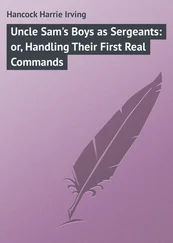Elbridge Brooks - Historic Boys - Their Endeavours, Their Achievements, and Their Times
Здесь есть возможность читать онлайн «Elbridge Brooks - Historic Boys - Their Endeavours, Their Achievements, and Their Times» — ознакомительный отрывок электронной книги совершенно бесплатно, а после прочтения отрывка купить полную версию. В некоторых случаях можно слушать аудио, скачать через торрент в формате fb2 и присутствует краткое содержание. ISBN: , Жанр: foreign_antique, foreign_prose, Биографии и Мемуары, на английском языке. Описание произведения, (предисловие) а так же отзывы посетителей доступны на портале библиотеки ЛибКат.
- Название:Historic Boys: Their Endeavours, Their Achievements, and Their Times
- Автор:
- Жанр:
- Год:неизвестен
- ISBN:http://www.gutenberg.org/ebooks/27157
- Рейтинг книги:3 / 5. Голосов: 1
-
Избранное:Добавить в избранное
- Отзывы:
-
Ваша оценка:
- 60
- 1
- 2
- 3
- 4
- 5
Historic Boys: Their Endeavours, Their Achievements, and Their Times: краткое содержание, описание и аннотация
Предлагаем к чтению аннотацию, описание, краткое содержание или предисловие (зависит от того, что написал сам автор книги «Historic Boys: Their Endeavours, Their Achievements, and Their Times»). Если вы не нашли необходимую информацию о книге — напишите в комментариях, мы постараемся отыскать её.
Historic Boys: Their Endeavours, Their Achievements, and Their Times — читать онлайн ознакомительный отрывок
Ниже представлен текст книги, разбитый по страницам. Система сохранения места последней прочитанной страницы, позволяет с удобством читать онлайн бесплатно книгу «Historic Boys: Their Endeavours, Their Achievements, and Their Times», без необходимости каждый раз заново искать на чём Вы остановились. Поставьте закладку, и сможете в любой момент перейти на страницу, на которой закончили чтение.
Интервал:
Закладка:
"For me; this for me?" he said, and, in seeming surprise, laid his hand upon the arm of his friend Aufidius. Then, as if remembering that he was a Stoic, whose desire was to show neither surprise, pleasure, nor pain, let what might happen, he read the scroll carefully, placed it in his mantle, and said, half aloud: "How ridiculous is he who is surprised at any thing which happens in life!"
"What is it that so disturbs you, O Marcus?" Aufidius asked.
"Friends," said the lad, "this scroll from my uncle Antoninus tells me that I am named by the Emperor's council as prefect 1 1 Præfectus urbi : governor of the city.
of the city while the consuls and magistrates are at the Latin Games."
"Hail to thee, Prefect! hail! hail! hail!" cried Aufidius and Sejus, while the whole company joined in a respectful salute.
"Would it were some one more worthy than I, Aufidius," said Marcus, solemnly.
"Nay, it is rightly decreed, my Marcus," protested his friend, proudly. "Did not Hadrian, the Emperor, himself say of thee: ' Non Verus, sed Verissimus! ' 2 2 Not true, but most true.
and who but thee, Marcus Verissimus – Marcus the most true – should be the governor of Rome?"
"But think of it, friends! I am but a boy after all. Who can respect a prefect of sixteen?" still queried the modest Marcus.
Sejus at once dipped into history.
"And why not, O Marcus?" he asked. "Was not Tiberius Cæsar a public orator at nine, and Augustus a master of the horse at seventeen? Was not Titus a quæstor 3 3 An officer of the treasury.
before he was eighteen, and the great Julius himself a priest of Jupiter at fourteen? And why, then, should not Marcus Verus, in whose veins runs the blood of the ancient kings, rightly be prefect of the city at sixteen?"
"Thou art a good pleader, my Sejus," Marcus said pleasantly. "Since, then, I must be prefect, may I be a just one, and take for my motto the text of the good Rusticus: 'If it is not right, do not do it; if it is not true, do not say it.' So, forward, my good friends! The lictors await me at the city gate."
So they pressed forward and, with more decorum, rode along the Via Cassia and across the Milvian Bridge to the broader Via Lata and the city gate. Here an escort of six lictors with their rods of office welcomed Marcus, and, thus accompanied, the young magistrate passed down the Via Lata – the street now known as "the Corso," the great thoroughfare of modern Rome – to the palace of his uncle Antoninus, near the Cœlian Gate.
"Hail, Prefect!" came the welcome of the noble uncle (one of the grand characters of Roman history). "And how fare the hens of Lorium?" For the good proconsul, so soon to be hailed as Cæsar and Emperor, loved the country pleasures and country cares of his farm at Lorium more than all the sculptured magnificence of the imperial city.
"The hens are well conditioned, O Antoninus," answered the boy, simply.
"But what said I?" his uncle exclaimed gayly. "What cares a prefect of Rome for the scratching hens of Lorium? As for me, most noble Prefect, I am but a man from whom neither power nor philosophy can take my natural affections"; and, as the parrot swinging over the door-way croaked out his " Salve! " (Welcome!), arm-in-arm uncle and nephew entered the palace.
Marcus Annius Verus was in all respects a model boy. Not the namby-pamby model that all human boys detest, but a right-minded, right-mannered, healthy, wealthy, and wise young Roman of the second century of the Christian era. At that time (for the world was not yet Christianized) there flourished a race of teachers and philosophers known as Stoics – wise old pagans, who held that the perfect man must be free from passion, unmoved by either joy or grief, taking every thing just as it came, with supreme and utter indifference. A hard rule that, but this lad's teachers had been mainly of the "School of the Stoics," as it was called, and their wise sayings had made so deep an impression on the little Marcus that, when only twelve years old, he set up for a full-fledged Stoic. He put on the coarse mantle that was the peculiar dress of the sect, practised all their severe rules of self-denial, and even slept on the hard floor or the bare ground, denying himself the comfort of a bed, until his good mother, who knew what was best for little fellows, even though they were Stoics, persuaded him to compromise on a quilt. He loved exercise and manly sport; but he was above all a wonderful student – too much of a student, in fact; for, as the old record states, "his excess in study was the only fault of his youth." And yet he loved a frolic, as the adventure with the shepherds proves.
Of the best patrician blood of old Rome; the relative and favorite of the great Emperor Hadrian; a splendid scholar, a capital gymnast, a true friend, a modest and unassuming lad; he was trying, even at sixteen, to make the best of himself, squaring all his actions by the rule that he, in after years, put into words: "I do my duty; other things trouble me not." Is not this young pagan of seventeen centuries back worthy to be held up as a model boy? Manly boys, with good principles, good manners, and good actions, are young gentlemen always, whenever and wherever they may live; and quickly enough, as did young Marcus of Rome, they find their right place in the regard and affections of the people about them.
Well, the days of waiting have passed. The great festival to Jove, the Feriæ Latinæ , has drawn all the high magistrates to Mount Albanus, and in their stead, as prefect of the city, rules the boy Marcus. In one of the basilicæ , or law courts of the great Forum, he sits invested with the toga of office, the ring and the purple badge; and, while twelve sturdy lictors guard his curule chair, he listens to the cases presented to him and makes many wise decisions – "in which honor," says the old record, "he acquitted himself to the general approbation." It was here no doubt that he learned the wisdom of the words he wrote in after life: "Do not have such an opinion of things as he who does the wrong, or such as he wishes thee to have, but look at them as they are in truth."
"Most noble Prefect," said one of the court messengers, or accensi , as they were called, "there waits, without, one Lydus the herdsman, demanding justice."
"Bid him enter," said Marcus; and there came into the basilica one whose unexpected appearance brought consternation to Aufidius and Sejus, as they waited in the court, and caused even the calm face of Marcus to flush with surprise. Lydus the herdsman was none other than their old acquaintance, the shepherd of the Etruscan highway!
"Most noble Prefect," said the shepherd, with a low salutation, "I am a free herdsman of Lake Sabatinus, and I ask for justice against a band of terrible highwaymen who lurk on the Via Cassia, near to old Veii. Only three days since, did these lawless fellows beset me and my companions, with our flocks, on the highway, and cruelly rob and maltreat us. I pray thee, let the cohortes vigilum 4 4 Armed police.
search out and punish these robbers; and let me, too, be fully satisfied for the sheep they did force from me."
"Not so fast, man," said Marcus, as the shepherd concluded his glib recital. "Couldst thou identify these knaves, if once they were apprehended?"
"Ay, that could I, noble Prefect," replied the shepherd, boldly. "They were led on by three as villainous rascals as go unhung, and these had with them a crowd of riotous followers."
"Ha! is it so?" said Marcus. "Aufidius! Sejus! I pray you, step this way." His two friends, in some wonder as to his intention, approached the tribunal; and Marcus, stepping down from his curule chair, placed himself between them. "Three villainous rascals, thou didst say. Were they aught like us, think'st thou?"
Читать дальшеИнтервал:
Закладка:
Похожие книги на «Historic Boys: Their Endeavours, Their Achievements, and Their Times»
Представляем Вашему вниманию похожие книги на «Historic Boys: Their Endeavours, Their Achievements, and Their Times» списком для выбора. Мы отобрали схожую по названию и смыслу литературу в надежде предоставить читателям больше вариантов отыскать новые, интересные, ещё непрочитанные произведения.
Обсуждение, отзывы о книге «Historic Boys: Their Endeavours, Their Achievements, and Their Times» и просто собственные мнения читателей. Оставьте ваши комментарии, напишите, что Вы думаете о произведении, его смысле или главных героях. Укажите что конкретно понравилось, а что нет, и почему Вы так считаете.












